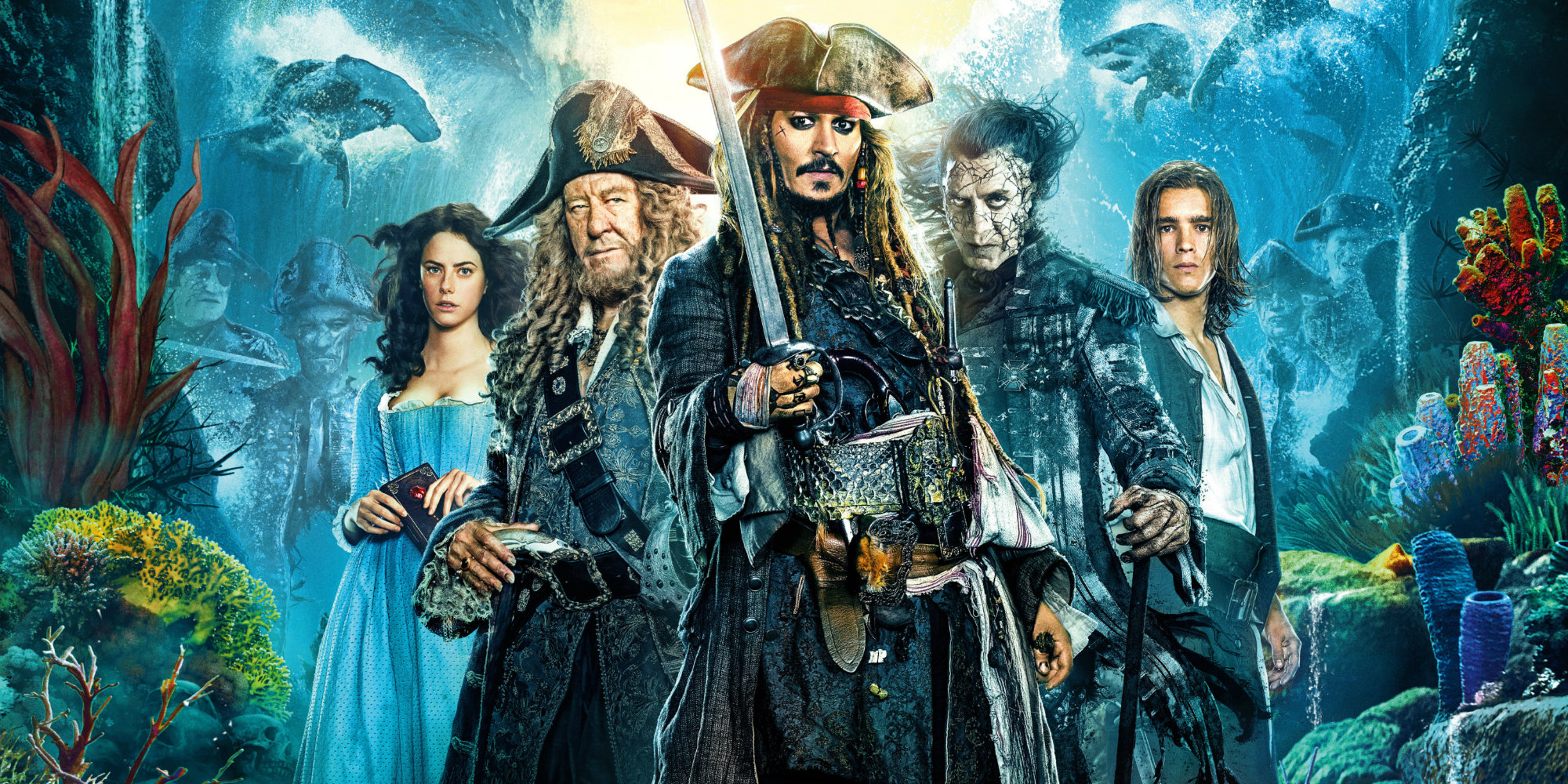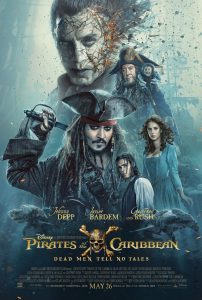 When Captain Jack Sparrow (Johnny Depp) first sailed into cinemas fourteen years ago in Pirates of the Caribbean: The Curse of the Black Pearl, it was a surprisingly fresh, electrifying experience – especially considering how much the film had working against it. Based on a theme park attraction in a genre everyone had long-assumed was box-office poison, the film was a risky experiment for Disney. More at home alongside their more mature efforts such as 20,000 Leagues Under the Sea (1954) and Treasure Island (1950), this was the studio’s first PG-13 release – a far cry from the fairy-dusted, family-friendly output most associated with a company headlined by a chummy, red-shorted rodent. Much to everyone’s amazement (and Disney executive’s relief), Pirates of the Caribbean was a huge success, snagging critical praise, a myriad of awards and nominations, and delivering one of the best swashbuckling adventures in the last three decades; yet, what truly set Pirates ablaze with fiery energy was Depp’s daring, entirely unique portrayal of its pirate lead.
When Captain Jack Sparrow (Johnny Depp) first sailed into cinemas fourteen years ago in Pirates of the Caribbean: The Curse of the Black Pearl, it was a surprisingly fresh, electrifying experience – especially considering how much the film had working against it. Based on a theme park attraction in a genre everyone had long-assumed was box-office poison, the film was a risky experiment for Disney. More at home alongside their more mature efforts such as 20,000 Leagues Under the Sea (1954) and Treasure Island (1950), this was the studio’s first PG-13 release – a far cry from the fairy-dusted, family-friendly output most associated with a company headlined by a chummy, red-shorted rodent. Much to everyone’s amazement (and Disney executive’s relief), Pirates of the Caribbean was a huge success, snagging critical praise, a myriad of awards and nominations, and delivering one of the best swashbuckling adventures in the last three decades; yet, what truly set Pirates ablaze with fiery energy was Depp’s daring, entirely unique portrayal of its pirate lead.
Depp’s Sparrow was an unpredictable wonder. Calculatingly buffoonish on the outside whilst masking a dynamic, quick-wit cleverness, it was as easy to underestimate the character at first glance from an audience perspective as it was for the characters surrounding him. His sashaying, unbalanced nature made him as much an enigmatic figure to intrigue as it was to attempt to dissect. With the sequels that followed, the buffoon mask no longer served as pretense – it became ingrained to the DNA of the character to great detriment. Sparrow ceased to be a confident, dashing figure underscored with veiled acumen; rather, he devolved into a cowardly cartoon character, prone to high-pitched screams and bumbling lunacy with the occasional lucky break or wisecrack. His devilish smiles having faded into non-threatening titters, the sequels became increasingly bloated, overly convoluted, and befuddling as Sparrow’s original magnetism slowly lost its former power to attract.
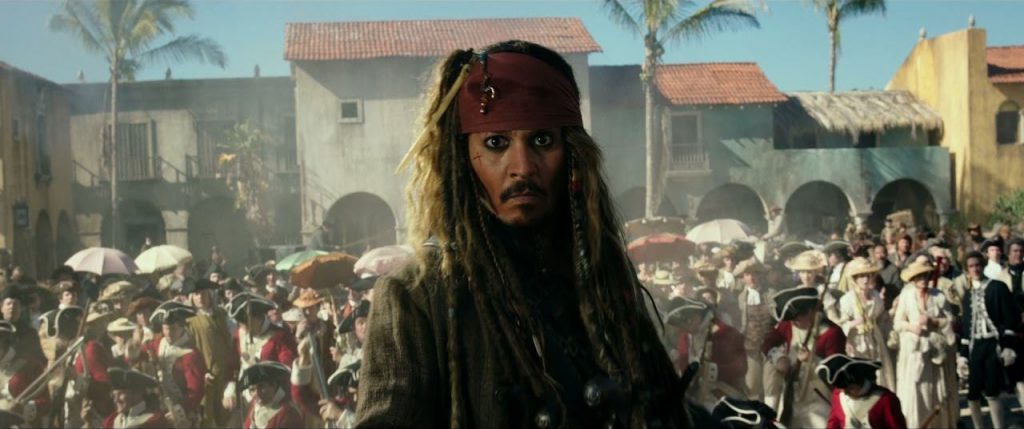
Despite the series’ downward turn, the films remained fun, giddy diversions with high-production values, imaginative set-pieces, and potent musical scores. Jack Sparrow, regardless of intellectual decline, retained enough vigor and charm to effortlessly entertain. With the series’ fifth entry, Pirates of the Caribbean: Dead Men Tell No Tales, such a claim would be most inopportune. Hoping to recreate the magic of the original film without understanding the ingredients that made it kick, Dead Men Tell No Tales not only fails on almost every level but it does the unimaginable – it castrates Jack Sparrow of his surviving legitimacy, reducing him to an irritating, fractured caricature of what had once been an Academy Award-nominated performance.
Five years after the events of On Strangers Tides, Captain Jack is left with little hope in the world. His beloved ship trapped in a bottle and a crew that’s deserted him, he’s become a doddering drunk (even more so than before). Meanwhile, the 19-year-old son (Brenton Thwaites) of Will Turner (Orlando Bloom) hopes to reverse his father’s curse by finding the legendary Trident of Poseidon. Meanwhile, a headstrong, “not a witch” scientist (Kaya Scodelario) is also on the road to the Trident in hopes of rediscovering her long-lost father. Meanwhile (!), pirate fleet Captain Barbossa (Geoffrey Rush), following the guidance of an actual sea-witch, embarks on a quest to discover the source of a growing threat that’s destroying his armada. MEANWHILE, the revenge-bent ghostly Captain Salazar (Javier Bardem) breaks free from the Devil’s Triangle with two goals in mind: kill Sparrow and “purify” the world of pirates (a goal which, as the film progresses, may make him an unintended protagonist to many tired of the series).
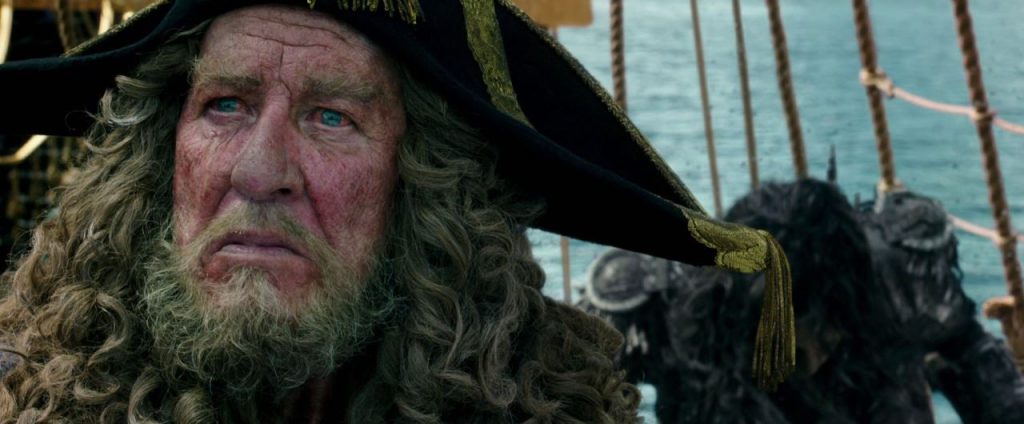
Pirates of the Caribbean: Dead Men Tell No Tales is the shortest entry in the series to date. The fact that it feels like the longest is a backbiting accomplishment. With a plot too elaborate for its own good that hinges on a cascade of coincidences to get in motion, the proceedings quickly grow tiring and – worse – predictable. There are few quiet moments here (other than to hammer in telegraphed jokes and romantic subtext). The film is too busy setting up its cockeyed circumstances that it forgets to forge any genuine relationships between its characters.
The new additions, particularly Thwaites and Scodelario, are adequate step-ups from the forgettable mermaid/man-of-faith combo from Tides but they are little more than Will and Elizabeth stand-ins from the original trio of films. Scodelario gets the worse end as she constantly huffs and puts everyone down around her (deserved or not) in the screenplay’s anemic attempt to make her a strong female lead. These efforts don’t make her a role model – they make her a grating presence. Bardem’s Salazar, despite the actor’s talent, is nothing more than an add-on to a long list of cursed, Jack-loathing antagonists.
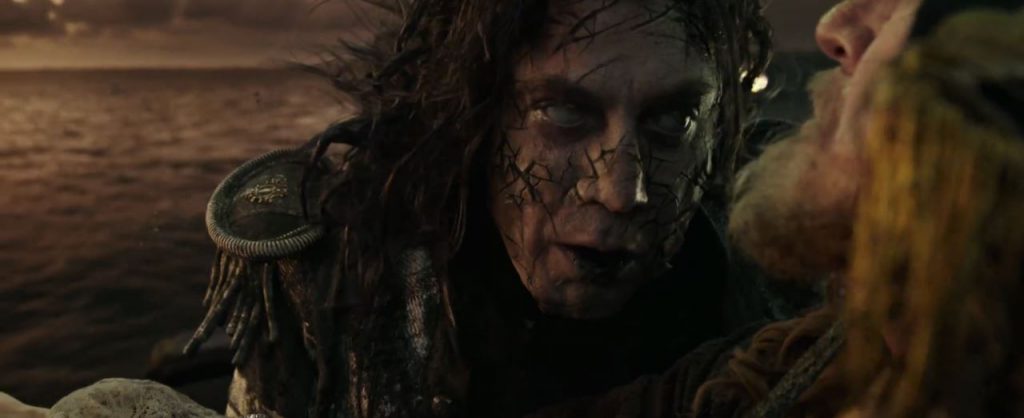
The biggest misstep is the aforementioned destruction of the Captain himself. Though Tides presented a glimmer of a return to form, Dead Men asphyxiates a once compelling presence. Gone are the clever lines and daring-do intensity. In place of crackerjack witticisms, Jack spends much of the film pointing out the obvious – “Horses,” “Sharks,” “Bridge,” and “Monkey,” he bemuses. What biting, ingenious dialogue! A far cry from memorable throwaways such as “…and then they made me their chief.”
He has no cunning escapes or moments of action. Heck, he only engages in swordplay for perhaps a total minute or two of screentime – minutes plagued by quick-cut, indecipherable edits. This is an idiot without redemption, in spite of the film’s initial suggestion of such an arc. He makes The Pink Panther‘s Inspector Clouseau look like a criminologist virtuoso by comparison. The film’s sole bright spite is the spirited Geoffrey Rush as Barbossa but given the dumbing down of Jack, their interactions no longer spark as enjoyable battle of wits that once commanded attention.
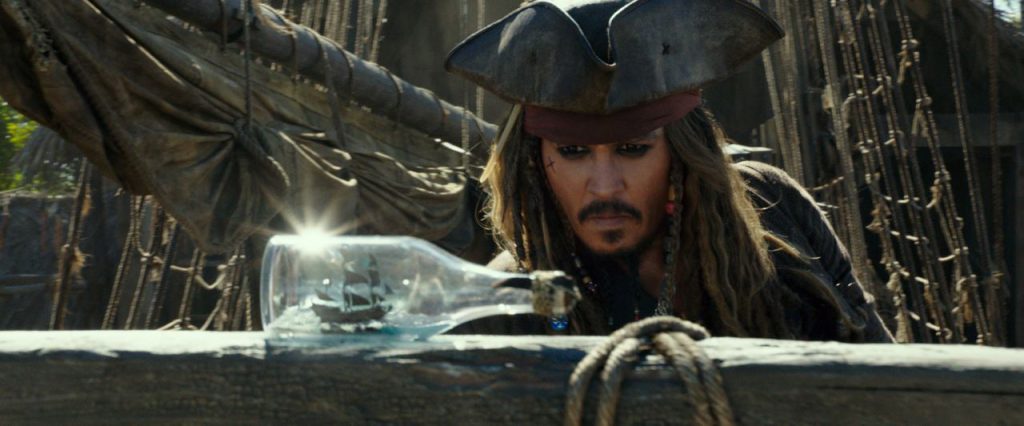
Besides Geoffrey Rush and a short amusing scene involving a guillotine, there’s little to recommend or enjoy here. The big set-pieces are as dry as Jack’s rum bottle. Even the most mediocre entry in the series had at least one entertaining, smile-inducing sequence such as Curse‘s stealing a small ship to gain a big ship, At World’s climactic maelstrom, Tides‘ mermaid battle, or Dead Man’s rolling wheel sword fight (Dead Man’s Chest and Dead Men Tell No Tales – how many dead men can one series feature before it’s an out-and-out massacre?). This film’s big “highlight”: a pack of horses dragging a seemingly unbreakable building through a city with a droopy, uninterested Captain Jack serving as the perfect analogy for what’s transpiring around him.
Near the beginning, Sparrow’s loyal right hand man, Mr. Gibbs (Kevin R. McNally), sadly admits that they’ve reached the end of the horizon. The same sentiment can be applied to the film. By the end, it may have been better off if those titular dead men had just lived up to their title.
Note: as with all the Pirate films, there is an after-credits scene. Also be sure to check out our video, The Hidden Curse of Pirates of the Caribbean: The Kiss of Death.














